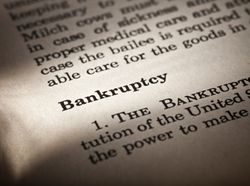When people consider bankruptcy they often wonder if they’ll be able to keep their car, home or even personal belongings. Fortunately, the bankruptcy laws are designed to help you get a fresh start and in the spirit of a fresh start they allow you to keep more than the shirt on your back with “Exemptions” i.e. property that you’ll be able to keep through the bankruptcy.
Exemptions come in two forms: State or Federal. Once you’ve lived in Florida for two years you must use our state exemptions. If you haven’t lived here quite that long you will need to use either your previous state’s exemptions or the federal exemptions.
Every state that has opted to create their own exemptions has it’s own nuances. For example, a bankruptcy debtor in Texas is allowed to keep a gun as well as a certain amount of homestead property. Maine allows a debtor to keep a wedding ring of unlimited value and one of each type of farm equipment needed to raise and harvest crops. Florida allows you to keep $1,000 in vehicle equity, $1,000 in personal property (beds, jewelry, televisions, etc.) and either $4,000 of additional personal property or the benefit of a homestead of any value. Back when homes were worth more than was owed on them, the unlimited homestead exemption was a huge benefit to people in bankruptcy. The unlimited homestead allows you to file a Chapter 7 bankruptcy, keep a three million dollar homestead and discharge three million dollars in credit card debt. Unfortunately, not a lot of people have three million dollars in household equity these days. In fact, as stated in our Jacksonville Report Rate of Florida Mortgages Underwater Down, 46 percent of home-owners currently owe more on their mortgages than those homes are worth. As a result, more people than ever are entering bankruptcy with homes that have no equity at all. When choosing between a house with no equity and keeping an extra $4,000 in personal property, the right decision is not always clear. Economically, it makes sense to take the $4,000 and give up the house, but for many people a home means more than bare dollars and cents. Fortunately, a new case from the Florida Supreme Court Osborne v. Dumoulin allows some people who have filed bankruptcy to keep both the $4,000 exemption for personal property and keep their homestead. This gives them the best head start in their life after bankruptcy without having to move out and it helps keep their children in the same school district.
 Jacksonville Bankruptcy Lawyer Blog
Jacksonville Bankruptcy Lawyer Blog



 There are many reasons that it would be advantageous to file for bankruptcy, but here are some of the most common reasons:
There are many reasons that it would be advantageous to file for bankruptcy, but here are some of the most common reasons: